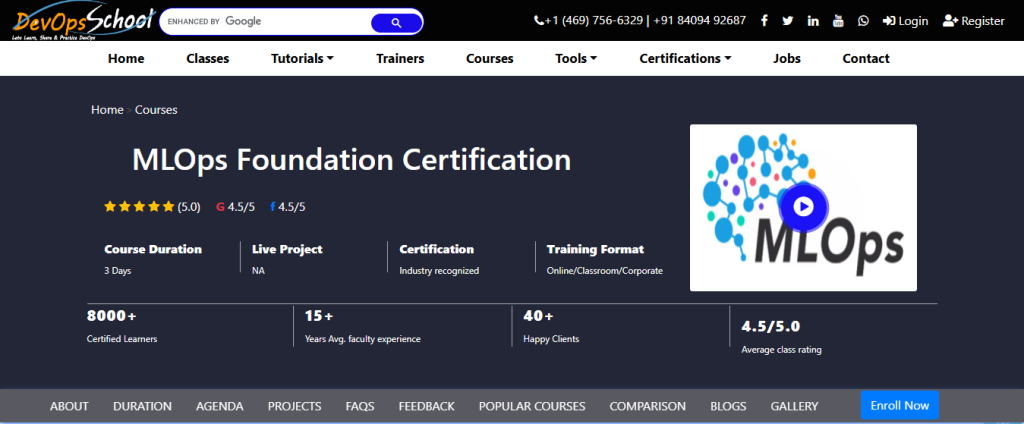
1. Introduction to the MLOps Foundation Certification
- Overview: The MLOps Foundation Certification provides students with a foundational understanding of Machine Learning Operations (MLOps), equipping them with skills to bridge the gap between machine learning (ML) development and production environments. With MLOps, organizations can seamlessly integrate ML models into production while maintaining efficiency, security, and scalability.
- Certifying Body: DevOpsSchool, in partnership with renowned trainer Rajesh Kumar (RajeshKumar.xyz), offers this certification. DevOpsSchool is recognized for delivering high-quality, industry-relevant DevOps and MLOps training.
- Goal of the Certification: This certification program is designed to empower participants with the skills required to build, deploy, monitor, and manage ML models effectively in production, leveraging best practices in MLOps.
2. Target Audience
- Who Should Enroll: This certification is intended for data scientists, ML engineers, DevOps practitioners, software engineers, and IT professionals aiming to gain expertise in deploying and managing ML models in production.
- Prerequisites: Basic knowledge of Python programming, machine learning fundamentals, and DevOps practices is recommended. However, the course provides introductory modules for those new to MLOps.
3. Key Learning Objectives
- Gain a strong understanding of the MLOps lifecycle, including model development, deployment, and monitoring.
- Build and automate CI/CD pipelines specifically for ML workflows.
- Learn infrastructure management for ML, including containerization, orchestration, and automation.
- Understand methods for monitoring, optimizing, and maintaining ML models in production.
- Acquire proficiency with industry-standard tools like Docker, Kubernetes, Jenkins, and cloud platforms.
4. Curriculum Outline
| Section | Content |
|---|---|
| 1. Welcome and Introduction | Overview of the Certification Program: Introduction to the MLOps Foundation Certification, its purpose, and benefits. Expectations and Outcomes: Practical knowledge and tools for deploying and managing ML models in production. |
| 2. Understanding MLOps | Definition and Importance of MLOps: Role of MLOps in scaling and managing ML models. Key Components of the MLOps Lifecycle: Stages from data management to model monitoring. MLOps vs. DevOps: Differences and unique challenges in MLOps. |
| 3. Machine Learning Basics | Overview of Machine Learning Concepts: Fundamental ML concepts and workflows. Types of ML: Supervised, Unsupervised, and Reinforcement Learning explained with examples. |
| 4. MLOps Lifecycle | Stages of the MLOps Lifecycle: Covers data collection, model training, deployment, monitoring, and maintenance. Collaboration Importance: Benefits of collaboration between data science and operations teams for effective MLOps. |
| 5. Tools and Technologies | Popular MLOps Tools: Overview of MLflow, Kubeflow, TFX, and other relevant tools. Setting Up the Environment: Step-by-step guide to configure the environment for hands-on labs. |
| 6. Data Management in MLOps | Data Versioning and Management Techniques: Best practices for data consistency. Data Pipelines and ETL: Building ETL pipelines for data preparation. Data Management Tools: DVC, Apache Airflow, and their applications. |
| 7. Model Development and Training | Best Practices in Model Development: Data splitting, model evaluation, and hyperparameter tuning. Experiment Tracking: Importance of tracking results and versions. AutoML Tools: Intro to H2O.ai, Google AutoML, etc. |
| 8. Model Deployment Strategies | Deployment Techniques: Methods like batch, real-time, and streaming. CI/CD for ML: Applying CI/CD practices to ML model deployment. Containerization with Docker and Kubernetes: Using containers for scalable deployment. |
| 9. Hands-On Lab: Model Deployment | Model Deployment Exercise: Deploy a model using Flask or FastAPI. Reinforcement Through Exercises: Deploying endpoints, testing, and configuring containers. |
| 10. Model Monitoring and Maintenance | Importance of Model Monitoring: Track model accuracy and detect performance issues. Monitoring Techniques: Set up performance metrics, detect model drift, and set alerts. Retraining Strategies: Manage model drift with retraining. |
| 11. MLOps Governance and Compliance | Governance in MLOps: Practices for reproducibility, transparency, and documentation. Regulatory and Ethical Compliance: GDPR, CCPA, and ethical AI principles for fair, responsible ML model usage. |
| 12. Capstone Project | End-to-End MLOps Pipeline Development: Group project building a full MLOps pipeline. Project Presentations and Feedback: Students present projects for feedback and review. |
| 13. Certification Exam | Review of Key Concepts: Recap essential topics covered in the program. Exam Administration: Comprehensive test assessing both theory and practical knowledge. |
| 14. Closing Remarks and Next Steps | Acknowledgment and Certification: Congratulatory message and certification issuance. Future Learning Resources: Access to alumni network, additional resources, and further certifications. |
5. Practical Project Work
- Capstone Project: Students will apply learned skills in a real-world MLOps environment by building a complete ML pipeline that includes data ingestion, preprocessing, model training, deployment, monitoring, and optimization. This capstone project helps students showcase their practical skills and is evaluated by experienced instructors.
6. Key Tools and Technologies Covered
- Programming and Libraries: Emphasis on Python, popular ML libraries (scikit-learn, TensorFlow), and data analysis tools.
- DevOps and MLOps Tools: Hands-on experience with Docker, Kubernetes, Jenkins, MLflow, DVC, and cloud platforms (AWS, GCP, Azure).
- Cloud Platforms: Labs are conducted using cloud platforms for real-world simulation, with an option to work on-premises.
7. Benefits of Certification
- Career Enhancement: This certification validates skills in MLOps, highlighting proficiency in operationalizing ML models in a production environment.
- Industry Demand: With an increasing need for MLOps professionals, this certification opens career opportunities in a fast-growing field where skilled professionals are highly valued.
8. Assessment and Evaluation Criteria
- Quizzes and Assignments: Interactive quizzes and assignments after each module to reinforce concepts and ensure understanding.
- Capstone Project: A practical project evaluated on criteria such as innovative problem-solving, adherence to best practices, and project completion.
- Certification Examination: A final comprehensive exam that assesses theoretical knowledge and practical skills.
9. Certification and Post-Certification Benefits
- Digital Certificate: Upon completion, participants receive a verifiable digital certificate from DevOpsSchool.
- Exclusive Alumni Access: Graduates gain access to the DevOpsSchool alumni network, providing opportunities for networking, mentorship, and career guidance.
10. Registration Process and Fees
- How to Register: Instructions for registration are provided on the DevOpsSchool website, along with early-bird offers and discount options.
- Certification Fees: Clear information on certification costs, refund policies, and available scholarships or financial assistance.
11. Testimonials and Case Studies
- Participant Testimonials: Showcase testimonials from previous students who successfully applied MLOps in their workplaces.
- Real-World Case Studies: Practical examples illustrating how organizations have benefited from MLOps implementation, highlighting efficiency and reliability in ML models for production.




